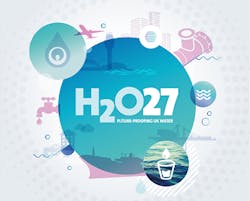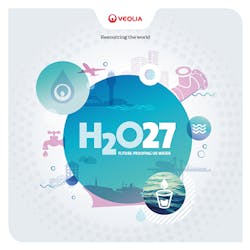UK needs to harness wastewater to meet future energy challenges, finds report
LONDON, England – Harnessing the power of wastewater will become a vital strategy to meet the UK’s energy needs and reduce carbon in the future.
That’s one of the outcomes from a new report - H2027 Future-proofing UK Water – which addresses the solutions needed for the UK water industry to meet growing demands over the next 10 years.
Published by Veolia, the report predicts that with a population of 73 million in the near future, the UK water industry will need to meet the challenges of “unpredictable rainfall combined with the need to reduce energy usage and carbon emissions”.
Six trends have been identified in the report, including Climate change, water scarcity and population growth; Automation, digital technology and workforce; Energy and carbon; New materials and treatment technology; Quality and environmental standards and New resource and re-use.
Under ‘Energy and carbon’, the challenge for 2027 will be to move towards energy self-sufficiency, cut carbon and exploit all the opportunities for customer-controlled energy, found the report.
Currently, the water industry is the fourth most energy-intensive industry in the UK, using approximately 3 percent of the country’s generated electricity for pumping, water treatment and wastewater management.
Harnessing the potential of seven million tonnes of human waste each year will become a vital strategy to meeting these challenges, Veolia said. Anaerobic Digestion (AD) and Combined Heat and Power (CHP) technology is advancing rapidly, with gas cleaning systems, lean-burn engine-based CHPs and thermal hydrolysis already creating the potential to double renewable generation capacity by 1,697 gigawatt hours – enough to power half a million homes.
Low-energy devices, controls and the use of consumption data will enable the industry to cut water consumption. At the same time, innovations like the recovery of low-grade heat from sewers could become a source of additional revenue.
Renewable energy from biogas will help drive the industry towards genuine carbon neutrality and energy self-sufficiency. As populations grow, more sludge will be available and this in turn will allow expansion in the ability to capture renewable biogas and generate renewable electricity.
The reportstated: “As treatment processes are further optimised and AD and CHP technology advances, the opportunity for greater energy self sufficiency and renewable energy export will rise. This would be further increased if any spare (headroom) capacity could be used for the co-digestion of energy crops or other liquid organic wastes.”
To lower energy demand and use optimised energy management, based on implementation of low energy devices, controls and the use of consumption data will enable the industry to make a step change in reducing demand side consumption.
Innovations like recovery of low grade heat from the sewer and nutrient recovery will be adopted more widely and create additional revenues in the future and boost sustainability.
John Abraham, chief operating officer, UK municipal water and Ireland, said: “By challenging the water industry we hope to create and drive further value and opportunity for the future and in turn reduce the environmental impact of distributing and recycling water.”
He added: “To achieve this, all elements of water infrastructure need to be better managed and optimised for greater efficiency using innovative solutions and using pioneering technologies developed across the world. By tackling the future trends now and creating a forward vision and ambitious goals we will be able to maintain water supplies, recycle water more efficiently, control costs and reduce energy usage and carbon emissions.”
###
Read more

